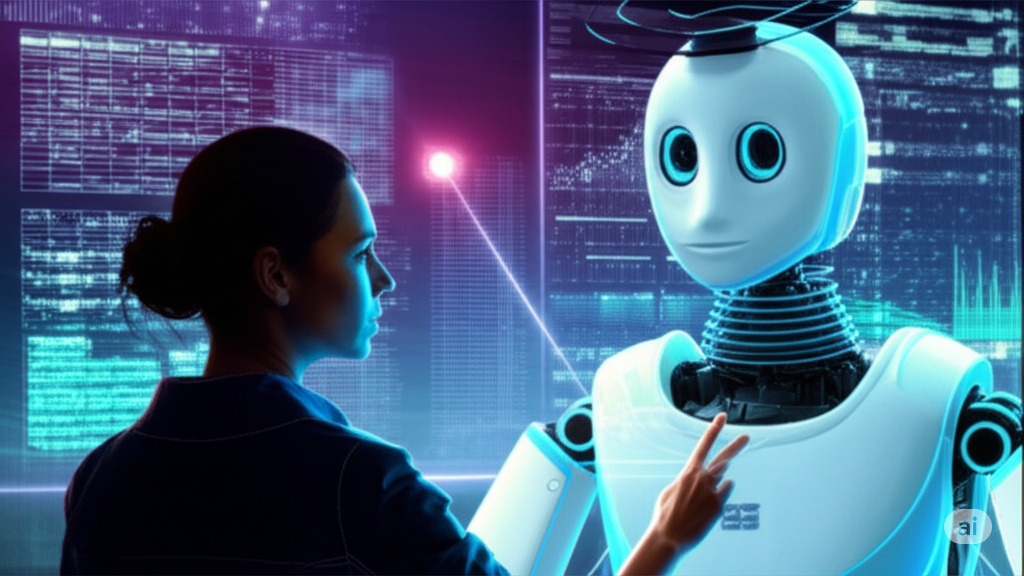The landscape of business is perpetually shifting, driven by technological advancements that promise greater efficiency, innovation, and competitive advantage. Among the most transformative of these emerging forces is agentic artificial intelligence (AI). Moving beyond the realm of passive tools and reactive algorithms, agentic AI represents a paradigm shift towards autonomous systems capable of perceiving their environment, setting goals, and taking actions to achieve those goals without explicit human intervention at every step. This profound capability is poised to revolutionize business operations across industries, reshaping workflows, optimizing decision-making, and unlocking unprecedented levels of productivity.
To truly grasp the magnitude of this revolution, it’s crucial to understand what distinguishes agentic AI from traditional AI. Conventional AI, while powerful in pattern recognition and data analysis, typically operates within predefined parameters and requires human oversight for task initiation and course correction. Think of a chatbot that answers customer queries based on a script or a predictive analytics tool that forecasts sales based on historical data. These are valuable tools, but they lack the inherent autonomy to identify new problems, formulate solutions, and execute them independently.
Agentic AI, on the other hand, embodies a higher degree of intelligence and independence. These systems are designed with core capabilities such as perception, allowing them to understand their operational environment through data, sensors, and other inputs; reasoning, enabling them to process information, identify patterns, and make logical deductions; planning, which involves formulating strategies and sequences of actions to achieve specific objectives; and action, the ability to execute those plans and interact with their environment. Furthermore, agentic AI possesses the crucial ability of learning and adaptation, allowing them to refine their strategies and improve their performance over time based on experience and feedback.
This inherent autonomy unlocks a plethora of transformative possibilities for business operations. Let’s delve into some key areas where agentic AI is set to make a significant impact.
Streamlining and Automating Complex Workflows
One of the most immediate and significant impacts of agentic AI will be the automation of intricate and often multi-stage workflows that currently require significant human involvement. Imagine a supply chain managed by intelligent agents that can autonomously monitor inventory levels, predict potential disruptions, negotiate with suppliers, and adjust logistics in real-time – all without constant human direction. Similarly, in financial services, agentic AI could handle complex tasks like fraud detection, risk assessment, and even personalized financial planning with minimal human oversight.
Consider the realm of customer service. While chatbots have provided a degree of automation, agentic AI can take this much further. Intelligent virtual assistants equipped with agentic capabilities can understand the nuances of customer issues, access and synthesize information from various sources, proactively offer solutions, and even escalate complex cases to human agents with a comprehensive context, leading to faster resolution times and enhanced customer satisfaction.
Furthermore, agentic AI can revolutionize project management. Intelligent agents can monitor project timelines, track resource allocation, identify potential bottlenecks, and even proactively suggest adjustments to keep projects on track and within budget. This level of autonomous oversight can significantly improve project success rates and free up human project managers to focus on more strategic initiatives.
Enhancing Decision-Making with Autonomous Insights
Beyond automation, agentic AI will profoundly impact how businesses make decisions. By continuously monitoring vast amounts of data and employing sophisticated reasoning capabilities, these systems can generate insights that might be missed by human analysts. Agentic AI can identify emerging trends, predict market shifts, and assess the potential impact of various strategic options with a level of speed and accuracy that is simply not feasible for human teams.
Imagine an agentic AI system analyzing market data, competitor activities, and internal performance metrics to autonomously identify new product opportunities or optimize pricing strategies in real-time. In the financial markets, agentic trading systems can execute complex trading strategies based on real-time market analysis, potentially outperforming human traders in certain scenarios.
The key here is the autonomous nature of these insights. Agentic AI doesn’t just present data; it interprets it, draws conclusions, and even recommends actions, empowering business leaders to make more informed and timely decisions. This shift from reactive analysis to proactive, AI-driven foresight can be a significant competitive differentiator.
Fostering Innovation and New Business Models
The capabilities of agentic AI extend beyond optimizing existing operations; they also pave the way for entirely new business models and innovative solutions. By autonomously exploring data, identifying unmet needs, and even generating novel ideas, agentic AI can act as a powerful engine for innovation.
Consider the pharmaceutical industry. Agentic AI could accelerate drug discovery by autonomously analyzing vast datasets of biological and chemical information, identifying potential drug candidates, and even designing novel molecules. This could significantly reduce the time and cost associated with bringing new therapies to market.
In the creative industries, agentic AI could assist in content generation, design, and even artistic creation, augmenting human creativity and enabling the development of entirely new forms of media and entertainment.
Furthermore, agentic AI can enable the creation of entirely new service offerings. Imagine personalized education platforms powered by intelligent agents that adapt to each student’s learning style and pace, or highly customized healthcare plans managed by AI agents that proactively monitor patient health and recommend interventions.
Addressing Complex and Unpredictable Environments
Traditional rule-based automation often struggles in dynamic and unpredictable environments. Agentic AI, with its ability to perceive, reason, and adapt, is particularly well-suited for navigating such complexities.
Consider logistics and transportation. Agentic AI-powered autonomous vehicles and drone delivery systems can optimize routes in real-time based on traffic conditions, weather patterns, and unforeseen obstacles, leading to faster and more efficient delivery services.
In manufacturing, agentic robots can adapt to changes in production schedules, identify and resolve equipment malfunctions autonomously, and even collaborate with human workers in flexible and dynamic ways.
The ability of agentic AI to operate effectively in uncertain environments opens up new possibilities for automation in sectors that were previously considered too complex for traditional AI solutions.
The Evolution of the Workforce and Human-AI Collaboration
The rise of agentic AI will undoubtedly have a significant impact on the workforce. While concerns about job displacement are understandable, the more likely scenario is a transformation of roles and the emergence of new forms of human-AI collaboration.
As agentic AI takes over routine and repetitive tasks, human workers will be freed up to focus on more strategic, creative, and interpersonal aspects of their jobs. New roles will emerge in areas such as AI system design, training, monitoring, and ethical oversight.
The key to navigating this transition successfully will be a focus on upskilling and reskilling the workforce to equip individuals with the skills needed to collaborate effectively with intelligent agents and to take on these new, higher-value roles.
Overcoming Challenges and Embracing the Future
While the potential of agentic AI is immense, its widespread adoption is not without challenges. Issues such as data privacy, algorithmic bias, security risks, and the need for robust ethical frameworks must be addressed proactively. Ensuring transparency and accountability in agentic AI systems will be crucial for building trust and fostering widespread acceptance.
Furthermore, the development and deployment of sophisticated agentic AI systems require significant investment in research, infrastructure, and talent. Businesses will need to develop clear strategies for integrating agentic AI into their operations and for managing the organizational and cultural changes that will inevitably follow.
Despite these challenges, the trajectory is clear. Agentic AI is not a distant future technology; it is rapidly evolving and poised to become a fundamental driver of business transformation in the coming years. Organizations that proactively explore the potential of agentic AI and develop strategies for its responsible and effective implementation will be well-positioned to thrive in the autonomous ascent of business operations.
Rare Insights into Agentic AI
Beyond the commonly discussed benefits, here are some less frequently highlighted aspects of agentic AI’s potential:
- Hyper-Personalization at Scale: Agentic AI can enable truly individualized experiences for customers, employees, and stakeholders by autonomously learning their preferences and adapting interactions and offerings in real-time at a massive scale. Imagine an e-commerce platform where AI agents curate a unique shopping experience for each user based on their browsing history, purchase patterns, and even real-time sentiment analysis.
- Autonomous Scientific Discovery: Agentic AI could revolutionize scientific research by autonomously designing and conducting experiments, analyzing results, and formulating new hypotheses, potentially accelerating breakthroughs in fields like materials science and biotechnology.
- Decentralized Autonomous Organizations (DAOs): Agentic AI could play a crucial role in the development and operation of DAOs, enabling autonomous governance, resource allocation, and execution of smart contracts without traditional hierarchical structures.
- Proactive Risk Management: Agentic AI can continuously monitor a wide range of internal and external data sources to proactively identify and mitigate potential risks, from cybersecurity threats to supply chain disruptions, often before they even materialize.
- Enhanced Accessibility and Inclusion: Agentic AI-powered assistive technologies can provide personalized support for individuals with disabilities, enabling greater independence and participation in the workforce and society. Imagine AI agents that can autonomously translate languages in real-time during meetings or provide personalized learning support for students with learning differences.
Frequently Asked Questions (FAQs)
- What is the core difference between agentic AI and traditional AI?
- Agentic AI possesses autonomy: the ability to perceive, reason, plan, act, and learn without explicit human instruction at every step. Traditional AI typically operates within predefined rules and requires human initiation and oversight.
- How can agentic AI improve customer service?
- Agentic AI-powered virtual assistants can understand complex queries, access diverse information sources, proactively offer solutions, and escalate issues with context, leading to faster and more effective customer support.
- Can agentic AI help with decision-making?
- Yes, by autonomously analyzing vast datasets, identifying patterns, and generating insights and recommendations that humans might miss, leading to more informed and timely decisions.
- Will agentic AI replace human workers?
- While some tasks will be automated, the more likely outcome is a transformation of roles and the emergence of new jobs focused on designing, training, and overseeing AI systems, as well as enhanced human-AI collaboration.
- What are some potential challenges in adopting agentic AI?
- Challenges include ensuring data privacy and security, mitigating algorithmic bias, establishing ethical frameworks, and managing the organizational and cultural changes associated with its implementation.
- In which industries is agentic AI likely to have the biggest impact?
- Potentially all industries, but early and significant impact is expected in areas like finance, healthcare, logistics, manufacturing, and customer service.
- How does agentic AI learn and adapt?
- Through machine learning techniques, agentic AI systems analyze the outcomes of their actions and feedback from their environment to refine their strategies and improve their performance over time.
- What are the key capabilities of an agentic AI system?
- Perception, reasoning, planning, action, and learning/adaptation.
- Can agentic AI foster innovation?
- Yes, by autonomously exploring data, identifying unmet needs, and even generating novel ideas, acting as a powerful engine for innovation in products, services, and business models.
- How can businesses prepare for the rise of agentic AI?
- By investing in research and development, developing clear integration strategies, focusing on upskilling their workforce, and proactively addressing ethical and societal implications.
- What role does data play in agentic AI?
- Data is crucial for agentic AI. It’s the fuel for perception, reasoning, and learning, enabling the systems to understand their environment and improve their performance.
- Are there different types of agentic AI?
- Yes, agentic AI can vary in complexity and capabilities, ranging from goal-oriented agents focused on specific tasks to more general-purpose agents with broader problem-solving abilities.
- How does agentic AI handle uncertainty and unexpected events?
- Through its perception, reasoning, and planning capabilities, agentic AI can analyze new information, adapt its plans, and take appropriate actions in response to unexpected events.
- What are the ethical considerations surrounding agentic AI?
- Key ethical considerations include ensuring fairness and avoiding bias, maintaining transparency and accountability, protecting data privacy, and addressing potential societal impacts like job displacement.
- What is the future outlook for agentic AI in business?
- The future outlook is highly transformative, with agentic AI expected to become increasingly integrated into business operations, driving greater automation, enhancing decision-making, fostering innovation, and creating new ways of working.
Table: Agentic AI in Action – Brands and Necessary Components
| Application Area | Example Brand/Concept | Necessary Agentic AI Components | Potential Price/Investment Level |
| Autonomous Supply Chain Mgmt | Cognitive Supply Chain (Hypothetical) | Perception (sensor data, market feeds), Reasoning (demand forecasting), Planning (logistics optimization), Action (automated orders), Learning (performance analysis) | High |
| Intelligent Customer Service | Next-Gen Virtual Assistant (Internal Development) | Perception (natural language understanding), Reasoning (intent analysis), Planning (dialogue management), Action (information retrieval, task execution), Learning (customer feedback) | Medium to High |
| Autonomous Trading Platform | AI-Driven Investment Bot (Hypothetical) | Perception (real-time market data), Reasoning (financial analysis), Planning (trade execution strategies), Action (automated trading), Learning (portfolio performance) | High |
| Agentic Project Management | Autonomous Project Coordinator (Software) | Perception (project timelines, resource allocation), Reasoning (risk assessment), Planning (task scheduling), Action (automated reminders, resource adjustments), Learning (project success metrics) | Medium |
| AI-Powered Drug Discovery | Autonomous Drug Discovery Platform (Pharma) | Perception (biological data, chemical structures), Reasoning (molecular interaction prediction), Planning (experiment design), Action (robotic lab automation), Learning (experimental results) | Very High |











+ There are no comments
Add yours